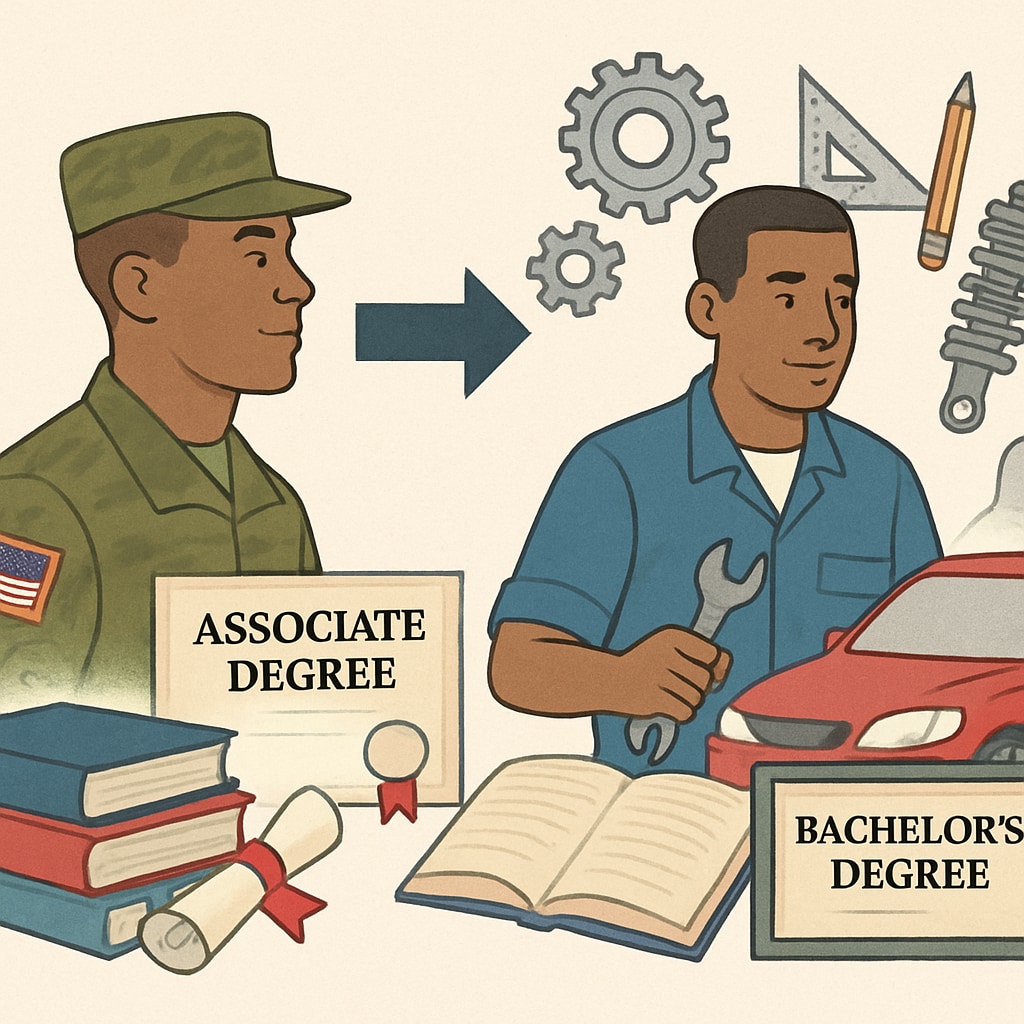For military personnel holding an associate degree in automotive technology, pursuing a bachelor’s degree is a strategic move for career growth. This pathway not only enhances expertise but also opens up new opportunities in areas like engineering, management, and education. In this article, we’ll explore how to navigate the transition, focusing on credit transfer strategies, degree options, and practical tips to make the most of this educational journey.

Why Transition to a Bachelor’s Degree?
While an associate degree in automotive technology provides a solid foundation in vehicle systems, diagnostics, and repair, a bachelor’s degree broadens your knowledge base and career prospects. For example, a bachelor’s degree can prepare you for leadership roles in automotive engineering, fleet management, or technical sales. In addition, it may make you eligible for higher salaries and more stable job opportunities.
According to the U.S. Bureau of Labor Statistics, fields like mechanical engineering and industrial production management often require a bachelor’s degree. Therefore, transitioning to a bachelor’s program can be a long-term investment in your career.
Credit Transfer: Maximizing Your Previous Education
One of the key considerations when advancing from an associate degree to a bachelor’s degree is the transfer of credits. Most institutions allow you to transfer credits from your associate degree, reducing the time and cost required to complete your bachelor’s program. However, the process can vary by university, so it’s essential to research each institution’s credit transfer policies.
Here are some tips for a smooth credit transfer process:
- Check Accreditation: Ensure that your associate degree is from an accredited institution, as this often influences credit transfer eligibility.
- Request a Credit Evaluation: Contact the admissions office of your chosen university to evaluate transferable credits.
- Match Curricula: Look for bachelor’s programs with curricula closely aligned to your associate degree to maximize transferable credits.
For example, many schools offer articulation agreements between community colleges and universities, designed to streamline the credit transfer process. Some universities also provide dedicated advisors to help military students navigate this transition.
Choosing the Right Bachelor’s Degree
Once you’ve addressed credit transfer considerations, the next step is selecting the right bachelor’s program. While your associate degree in automotive technology provides a specialized foundation, you don’t have to limit yourself to automotive-related fields. Here are some recommended bachelor’s degree options:
- Automotive Engineering Technology: A natural progression for those who want to deepen their technical expertise in automotive systems.
- Mechanical Engineering: Focuses on broader engineering principles, offering flexibility for roles beyond the automotive industry.
- Business Administration: Ideal for those interested in management roles within automotive companies or running their own business.
- Industrial Technology: Combines technical knowledge with management skills, preparing you for roles in manufacturing or production.
Each of these programs offers unique advantages depending on your career goals. For example, an automotive engineering degree focuses on advanced vehicle design, while a business-oriented program emphasizes management and organizational skills.

Tips for Military Students Advancing in Education
Military personnel face unique challenges when pursuing higher education, such as balancing work, deployments, and family commitments. Here are some strategies to succeed:
- Utilize Military Benefits: Make full use of benefits like the GI Bill or tuition assistance programs to fund your education.
- Choose Flexible Programs: Many universities offer online or hybrid courses, allowing you to study at your own pace.
- Leverage Military Experience: Some institutions may offer credit for military training or experience, further reducing your course load.
- Network with Veterans: Join veteran-focused groups or organizations on campus to build a support system.
Additionally, some schools have dedicated military advisors who understand the unique needs of service members and can help you navigate the academic environment.
Conclusion
Transitioning from an associate degree in automotive technology to a bachelor’s degree is a rewarding pathway for military personnel. By focusing on credit transfer strategies, exploring diverse degree options, and leveraging available military benefits, you can achieve your educational and career goals. Whether you aim to become an engineer, a manager, or a business owner, the right bachelor’s program can pave the way for future success.
Take the first step today by researching universities that align with your career goals and educational background. Your journey from the garage to the boardroom starts with a strategic plan for higher education.


